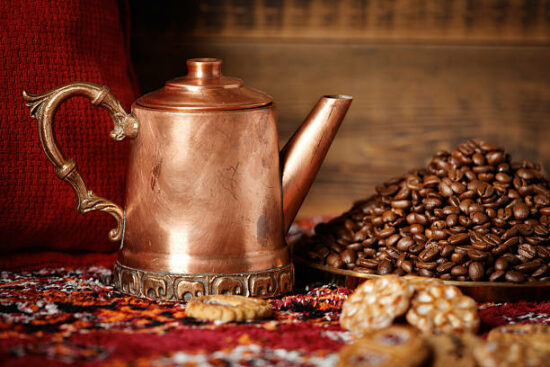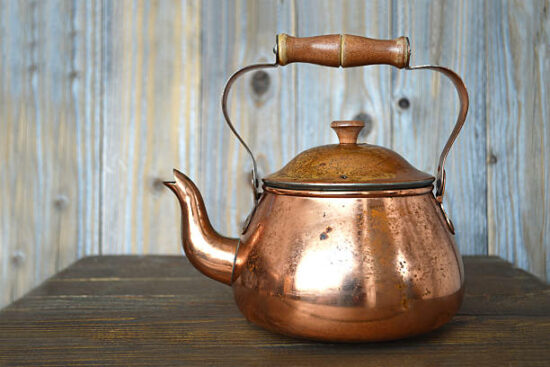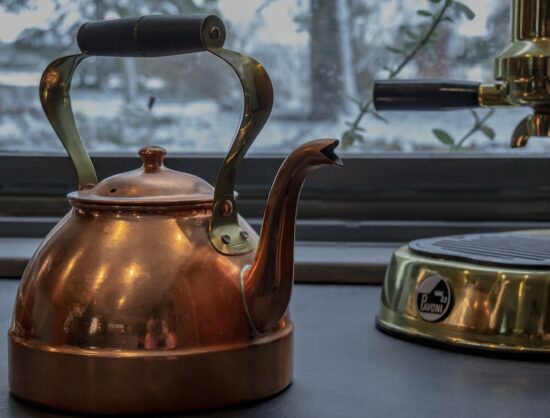Even though copper is a nutrient beneficial when ingested in trace levels found in food, cooking with copper kettles and pans can cause copper to leach into food, which can be hazardous. If they satisfy specific requirements, copper kettles are safe to use.
Is It Safe To Boil Water In A Copper Kettle?
A copper tea set has numerous advantages, one of which is its decorative statement in your kitchen. However, despite its advantages, there is always the nagging doubt about whether a copper kettle is safe.

Old and truly antique copper tea kettles are often made entirely of copper and have no protective coating. When used to boil water, this is potentially harmful. Consuming food and drinks that have had direct contact with copper may result in copper poisoning.
Several stomach and digestive system problems are among the signs and symptoms of copper poisoning. Modern teapots satisfy specific requirements that make them safe to use, even if many older copper teapots may be unsafe and may even result in copper tea kettle poisoning.

Benefits of copper tea kettles
Water will boil in a copper tea kettle more rapidly than in a glass or stainless steel kettle because copper is a great heat conductor. To boil water in a copper kettle, use medium heat. This makes copper more ecologically friendly than other materials since it saves time and energy.
High-end kettles are made to survive for 20 years or more depending on use, and do not rust. Even when brand-new copper kettles have a beautiful, vintage appearance, you can leave one on the stove or counter to spruce up your kitchen. Copper does not retain any flavor from different teas as regards flavor. Rinse the kettle or pot after each brew to get the best flavor from your tea.
The downsides of copper teapots and kettles
The drawback of contemporary copper cookware is that it needs regular maintenance to keep its appealing and brilliant appearance. When exposed to air, copper tarnishes and has to be polished periodically. Additionally, copper is a soft metal that may dent and scratch more easily than other substances. A solid copper kettle or teapot can be slightly more costly than stainless steel or glass.

How to clean the inside of a copper kettle
You must first have the following things to learn how to clean the inside of a copper kettle: Water, a microfiber cloth, a scrubbing pad, and detergent are also needed.
Do the following:
- Mix equal vinegar and lemon solution, then pour it in. Now, wait a few minutes for this solution to rest inside your kettle.
- Drain the solution after some time. Once more, prepare the solution, add water, and then simmer it in your kettle over low heat.
- Stop boiling and allow it cool when you hear the whistle.
- Next, scrub the kettle’s inside with your detergent and warm water mixture using a scouring pad.
- Rinse and dry the kettle.
Frequently asked questions
Is boiling water safe with stainless steel?
Yes. You can use kettles or pans made of stainless steel to boil water. These will give you the best heat conduction even if they conduct heat considerably more slowly than copper. If your pot is made entirely of stainless steel, you won’t have to worry about chipped steel falling off. This is due to the high thermal mass and high melting point of stainless steel. We will thus gain from it if we tend to overboil out of forgetfulness.
Your stainless steel kettles will be an exception since they have a nickel liner. You know, continued use might also result in the lining disappearing!
Which material boils water the best?
Water can be boiled using various materials, including cast iron, aluminum, ceramic, stainless steel, glass, and ceramic. The best of them, though, are stainless steel and borosilicate glass.

Jay
Jay is a health and wellness enthusiast with expertise in water quality and nutrition. As a knowledgeable advocate for holistic well-being, Jay successfully manages Type 2 Diabetes through informed lifestyle choices. Committed to sharing reliable and authoritative insights, Jay combines firsthand experience with a passion for enhancing health."
